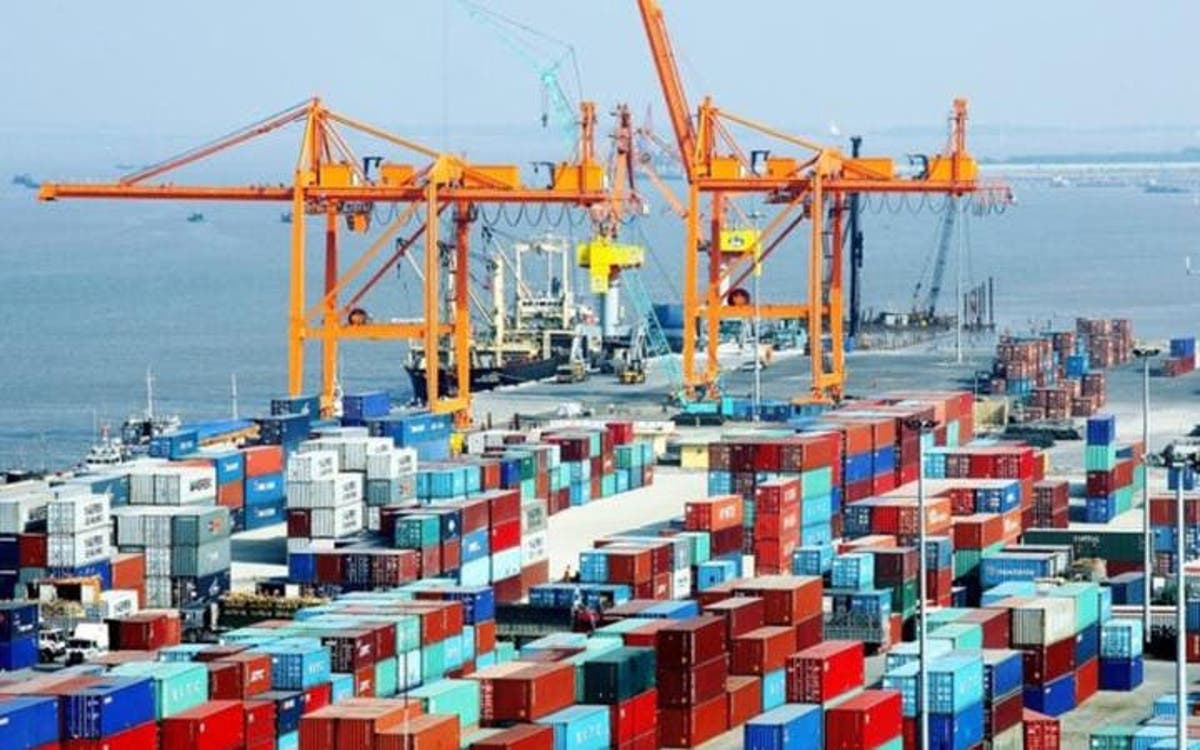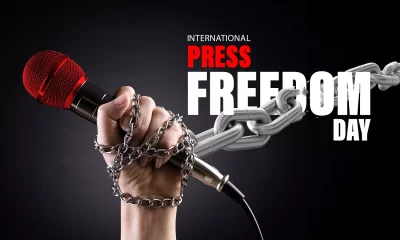Business
Seaports: Push or drags on Nigeria’s growth?
Published
4 years agoon
By
Publisher
By Marcel Okeke
“According to the sector operators, the cost of exporting 100 tons of cargo in Nigeria is US$35,000, compared to US$4,000 in Ghana. Today, the leading ports for West Africa are in Cote d’Ivoire, Ghana, Togo and Benin Republic. All these countries have modernized their port management systems, leaving Nigeria far behind” – Dr. Akinwunmi Adesina, President/Chief Executive Officer (CEO) of the African Development Bank (AfDB), gave the above assessment of Nigeria’s seaports during a mid-term retreat organized by the Nigerian government in Abuja.
Dr. Adesina’s view about Nigeria’s seaports, no doubt, vividly captures it all, and gives practically all dimensions to the rot, decay and grossly uncompetitive state of the nation’s seaports. The prohibitively exorbitant cost of doing business in Nigeria’s ports; the unimaginably decrepit port infrastructure and the deplorably repulsive management systems and styles in those ports are all portrayed in the AfDB CEO’s verdict. Unfortunately this state of affairs has been with the ports long; but particularly since Nigeria’s return to democracy in 1999. Yet, in other climes in Africa or elsewhere, seaports’ utilization remain prime drivers of economic growth and development.
But here in Nigeria (even with its very wide littoral (ocean) boundaries (in the South), a catalogue of issues and challenges dwarf the maritime business. From the analogue clearing processes and documentation with prohibitively high charges to abandoned shipments and decrepit facilities, Nigerian ports (especially the Lagos or Apapa) have become and remained a nightmare to their users. According to the Nigerian Ports Authority (NPA), by ending of 2021, there were over 6,000 abandoned containers across the ports – all causing congestion – the highest number being in Lagos. NPA added that the abandoned shipments, usually known as overtime cargoes, included over 1,800 vehicles.
This lingering bottleneck reportedly cost exporters an estimated N100 billion in damaged products, according to the Shippers Association of Lagos.
The upshot of all these is completely frustrated and stunted export drive; diversion of (export/import) maritime businesses to neighboring (smaller but cost-effective) countries in the West African sub-region, as Dr. Adesina pointed out. This is a crisis to which Nigeria has lost huge accruable billions of revenues in several years. In the face of this avoidable humongous loss, the Nigerian Ports Authority (NPA), apparently reluctantly opted to divert vessels from Lagos to the Eastern Ports to tame the bedlam that has enveloped the whole of Apapa and its environs as a result of port activities.
For too long, the facilities at the Lagos ports (of Apapa and Tin Can Island) have been overstretched and neglected, resulting in their inability to cope with the volume of cargoes that have had to pass through them, while the ports of Calabar, Rivers, Delta and Onne (collectively referred to as the Eastern Ports), have remained largely abandoned. And this is why not a few ships have been diverting to the neighbouring countries of Benin Republic, Togo, Ghana and even Cameroun which, with recent investments in their ports, could boast better operational efficiency.
Naturally therefore, while the largest chunk of the cargoes in West Africa are bound for Nigeria, ships prefer to dock in the neighbouring Cotonou or Lome ports, which are less chaotic and better run. From there, the goods will then find their way into Nigeria through the land borders; aiding and abetting thriving smuggling activities. This, obviously, has unwittingly led to Nigeria losing a lot of badly needed revenues. And because much of the goods cleared in neighbouring countries enter the country as smuggled items, their importers evade payment of the requisite customs duties.
Worse still, the country has lost control over ships carrying cargoes meant for the landlocked neighbours such as Niger and Chad, which hitherto used to pass through Nigeria. Ships spend weeks in the sea, waiting for opportunity to dock at either the Apapa port or the Tin Can port. At the same time, goods bound for export are stuck in endless gridlock caused by trailers that have now replaced the rail system as the dominant means of carrying goods from the ports into the hinterland. This frustrating situation is further compounded by the poor state of roads and the continued closure of Nigeria’s borders, which has forced ships that would have discharged some of the Nigerian-bound goods in Benin and Togo, to invariably come to Lagos.
All these continue to put a huge question mark on the seriousness of successive Governments about their much-talked-about diversification of the Nigerian economy. This is because given the critical role seaports could play in export drive to generate revenue, even the ‘diversion’ of ships to the Eastern Ports at this point in time is a no-brainer. While the ‘diversion’ constitutes a mere relief to the Lagos ports, it does not address the wilful neglect or abandonment of those ports. It has been argued ad nauseam that it does not make sense for businessmen in Onitsha or Owerri, for example, to route their imports through Lagos when they could easily have passed through either Calabar or Port Harcourt.
But rather than upgrade (by dredging, reclamation and others) and properly utilize the Eastern ports, Government efforts for some years now have been focused on building additional ports around Lagos.There is the Lekki Deep Seaport reportedly being developed by Tolaram and China Harbour Engineering Company, Lagos State Government and NPA. The port is scheduled to start operations by the end of 2022. At a recent conference on non-oil export in Lagos, Governor Babajide Sanwao-Olu had described the new port as “the largest in West Africa”, adding that it would “provide enormous opportunities to exporters to ply their trade and by extension, improve the export earnings of the country”. The Governor also disclosed the impending commencement of work on the Badagry Deep Seaport, when he said the construction would start in June “once the state is granted ratification by the Federal Government.” But he quickly noted that the Badagry port plan had been on ground in the past one decade or so, having been initiated by former Governor Babatunde Fashola.
However, even with all these, an area that should be of immense concern to the NPA should be the turnaround time of the existing ports – the difference between date of departure and the date of arrival of ships. For Nigerian ports to be competitive and more efficient, the turnaround time has to be reduced drastically. According to the World Bank, dwell time is an important instrument used to attract cargo and generate revenues. A shorter time is indicative of port efficiency.
However, given the dwindling revenue base of the Government of the day, wouldn’t it be expedient to seek a takeover of some of the ports by private investors? In what is dubbed the Maritime Silk Road, China has been buying up and developing a chain of ports in Asia, Africa, Europe, South America and in the Middle East. If this is done in Nigeria, the country will not only earn huge money, the ports will most likely become more competitive and impact positively on the Nigerian economy. We, as a country, cannot afford to continue to lag behind the rest of the world in the highly lucrative maritime business.
“We need to go to Abuja to get a re-ratification because it is NPA that owns the license for port. So, we need to get ratification from Abuja.“That process has started and we are praying that before the end of April, we will get that ratification,” Sanwo-Olu was quoted as saying in a statement by his spokesman, Gboyega Akosile, titled, ‘Sanwo-Olu: We’ll deliberately push more development to Badagry Continuing, he said, “Once we get that ratification, by the grace of God we will plan to see if we can start something by June. Once we get that ratification, two months, we must activate something. We want to start the project as soon as possible. We want to deliberately push development to this axis.
“The Badagry Deep Sea Port Project is not just one project; it is a multi-level opportunity for progress for all the people of this State in view of the volume of trade and quantum of investment opportunities that would spring up in the area when the project commences, and when it is completed and operational. Very importantly, employment and capacity building for the teeming youth and women in the affected communities will be prioritised.
“About 10 years ago during the administration of one of my predecessors, Mr. Babatunde Raji Fashola, this Sea Port Project, which is the reason we have organised today’s community engagement, was conceived as a flagship project that when fully operational, would not only boost the fortunes of the people of Badagry, but, also transform the entire economy of our State and that of the entire West African sub-region.
“As you are all aware, when completed, this deep sea port will be the second in the State after the one in Lekki, which is projected to be commissioned this year. It is expected that with these two deep sea ports, we will experience significant relief from the difficult challenges being experienced in the Apapa axis as a result of the activities at Tin Can port which has been overstretched beyond its installed capacity.”
Governor Sanwo-Olu also congratulated the Management of Badagry Port Development Limited and the host communities for being collaborators and joint beneficiaries of the laudable project which would positively impact lives and businesses, create wealth and improve standards of living in the Badagry division of Lagos State.
· Mr. Okeke, an economist, sustainability expert and business strategy consultant is a Columnist with National Daily. He can be reached at: [email protected]
Trending

 Health1 week ago
Health1 week agoSinger’s death sparks doctor’s takedown of snakebite myths, exposes public health gaps

 Education6 days ago
Education6 days agoOgun students call for increased funding to improve tertiary institutions

 Comments and Issues5 days ago
Comments and Issues5 days agoIfunanya died in the capital city—what hope is there for rural Nigerians?

 Football1 week ago
Football1 week agoBarcelona moves to secure Rashford permanently, target Romero

 Comments and Issues6 days ago
Comments and Issues6 days agoThe silent press and the silent siege

 Crime1 week ago
Crime1 week agoGunmen kill Anambra community leader in suspected cult revenge attack

 Football6 days ago
Football6 days agoAntony strikes as Real Betis exact revenge on Atletico Madrid

 Energy6 days ago
Energy6 days agoNCDMB introduces stricter guidelines to eliminate unqualified firms from oil contracts

